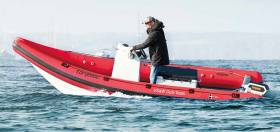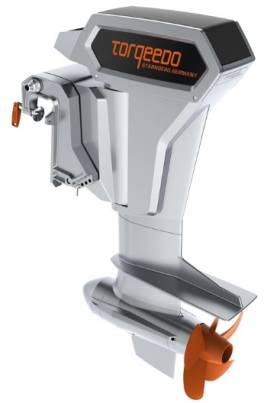Displaying items by tag: Torqeedo
Manuel Pardi recently returned to his home port of Buenos Aires in Argentina after a three-month 4,000-mile voyage in Pequod, a restored 28-ft steel-hull sailboat, to the continent of Antarctica.
And he did it sustainably with no fossil-fueled engine or generator on board.
Instead, the boat was equipped with a Torqeedo all-electric auxiliary propulsion system, which was recharged by solar and wind energy underway.
 Pequod, a restored 28-ft steel-hull sailboat
Pequod, a restored 28-ft steel-hull sailboat
Actually, this was Pequod’s second trip to Antarctica. The first was undertaken in 1987 by the sailboat’s original builder and owner Hernán Álvarez Forn. When Pardi started to plan his own voyage to the icy continent, he discovered Pequod abandoned and in a bad state of decay. He befriended Forn and together the two of them, with Francisco Gigena, an old traditional boatbuilder, worked to rebuild Pequod and make her seaworthy again.
Unfortunately, Forn died in November 2020 at the age of 94, just a couple of months before Pardi was due to set out on the voyage to Antarctica.
From the outset, Pardi wanted a boat that would be ecologically friendly and self-sustaining. “I wanted to get to the most pristine place on the planet without polluting,” he said. “My goal was to go to Antarctica generating zero carbon emissions.”
In rebuilding Pequod, they removed the old diesel engine and replaced it with a Torqeedo Cruise 4.0 pod drive with a folding propeller and a Torqeedo Power 48-5000 lithium-ion battery. For charging at sea, they installed an array of highly efficient solar panels, a 350W wind generator and a hydro generation system to create electric energy from water flowing beneath the boat. Naval-Electric SAS of Buenos Aires was responsible for installing, integrating and commissioning the complete electric system, which also included a battery monitor, charger, inverter, DC/DC converter and solar charge controllers, all managed by a mobile app.
 Manuel Pardi in the tender powered by a Torqeedo outboard electric engine
Manuel Pardi in the tender powered by a Torqeedo outboard electric engine
Pardi and his two crewmen got underway on the first day of 2021 and arrived at Deception Island on the coast of the southern continent on 17 February, after a harrowing sail across Drake’s Passage with 10 to 15 ft swells.
“The strong northwestern winds and mountains of water around us all made Pequod look like an ice cube in a cocktail,” he said.
Pardi and his crew enjoyed a few restful days on the beautiful and spectacular volcanic island. Before departing for the return voyage, they honoured the family’s request and scattered the ashes of Pequod’s builder and original skipper, Hernán Álvarez Forn. They arrived back in South America in late March.
“The voyage provided convincing proof of the feasibility of an all-electric ocean-going sailboat with renewable recharging,” said Nicolás Fóthy, CEO of Naval-Electric SAS. “Pequod did not even carry an auxiliary fuel generator. That’s why this expedition is a milestone in sailing this latitude.”
 Power 48-5000 battery
Power 48-5000 battery
“The Torqeedo system and the solar and wind generators performed flawlessly under challenging conditions of cold temperatures, high winds and heavy seas,” Pardi said. “We mostly were under sail, but we ran the Torqeedo drive during periods of calm and for manoeuvring in and out of narrow channels. It was a fabulous feeling to be gliding smoothly through the pristine waters of Deception Island with no noise, no exhaust fumes and no fuel sheen on the surface.”
German 'Electrified' Sailing Club Sets Example Through Electric Coach Boat with Torqeedo Propulsion
From yacht clubs to sailing schools and non-profit associations – sailing organisations around the world are using Torqeedo electric outboard engines to modernise their fleets, thereby reducing CO2 emissions and improving energy efficiency. As a pioneer, Verein Seglerhaus am Wannsee (VSaW), a tradition-rich Berlin club and the second oldest sailing club in Germany, has electrified one of its coach boats.
Modern and sustainable sailing clubs like Verein Seglerhaus am Wannsee put their faith in the successful Torqeedo electric drives to electrify their coaching and utility boats. The Cruise 10.0 outboard motor is now available with a new, even quieter gearbox, enabling optimum communication between the trainer and the team.
The company VSR, manufacturer of rigid-hulled inflatable boats, has optimised the VSR F10 model for electric propulsion systems by using extra-light materials and further improving hull efficiency. In a test, a 10 kWh battery bank consisting of two Power 48-5000 lithium-ion batteries had sufficient capacity for all-day operation at typical coaching speeds. With a top speed of 14 knots, run time is about an hour. If more range is required, additional batteries can be installed.
“We are proud that the traditional club VSaW has chosen to rely on innovative technologies to promote more sustainable sailboat racing in Germany’s capital,” says Dr. Christoph Ballin, CEO and co-founder of Torqeedo. Ballin continues: “Each step we take together towards cleaner mobility, be it on land or water, will benefit all.”
After extensive test drives during training and Optimist-class regatta sessions, VSaW youth coaches Lars Haverland and Marko Müller both unanimously agree: “The coach boat is easy to handle and runs very quietly and reliably. It is a great and pioneering step!”
There are also practical reasons for switching to electromobility: electric engines require considerably less maintenance than combustion engines, and electricity prices are lower and more stable than fuel prices. This allows sailing schools and yacht clubs to reduce their overall operating costs.
Note: Torqeedo will showcase its product line on booth 3.2/100, at BOOT & FUN BERLIN. You will find the Verein Seglerhaus am Wannsee on booth 25/450.
Torqeedo Electric Outboard Introduces New '20hp Equivalent'
Torqeedo, market leader in the fast growing electric outboard motor industry, will debut its innovative new electric motor at this year’s Seawork International exhibition in Southampton in June. In Ireland, the engine is available through Union Chandlery.
The new generation, the Cruise 10.0R, is equivalent to a 20HP combustion engine. It boasts 12kW peak power, 10kW continuous power and a voltage level of 48V to deliver impressive, emission-free performance at speeds of up to 17.2knots (31.9km/h).
The Cruise 10.0R weighs 47.2kg in its smallest variation and features a powered tilt function, alongside a maximum RPM standing at 1,400RPM, and 315lbs of static thrust. Available in three shaft lengths ranging from 38.5cm to 63.9cm, the Cruise 10.0R is suitable for a variety of boats.
With its very robust design, protected from corrosion, salt-water capable and completely waterproof, this new addition is suited for rugged environments and extreme conditions. It can provide the power and thrust for planing boats and displacement hulls up to the weight of 10 tonnes.






























































